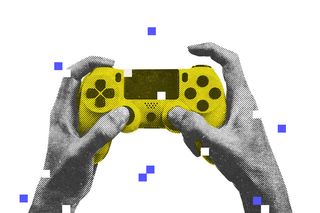
Video Games May Improve Decision‑Making Skills, Suggests Study
Researchers suggest that engagement with the medium, often viewed negatively, might help in improving brain activity when done in moderation.

Video games remain a much maligned art form — engagement with the medium is often viewed negatively, purported to contribute to chronic issues such as addiction and social isolation. They’re even blamed for acts of violence and terrorism — indeed, thepublic association of video games with real-life violence, especially in light of growing mass shooting events in the US, remains strong. But a string of studies conducted over the years suggest otherwise. The latest of these suggests that video games could help improve decision making skills among those who choose to engage with them.
Published earlier this month in the journal Neuroimage: Reports, the study incorporated 47 volunteering young adults in anexperiment. 28 of these volunteers were gamers, usually engaging in high-action real-time games, such as first-person shooter games, real-time strategy games, and team-styled “royal battle” or “arena games”. The scientists placed screens displaying a series of dots in front of the participants, and asked them to press buttons in response to the direction they were moving in.
The researchers found that regular gamers in the pool of participants were both faster and more accurate in their responses. Further, the researchers also used functional Magnetic Resonance Imaging (fMRI) to measure neural activity among the volunteers. The scans showed that the gamers experienced enhanced activity in parts of their brain associated with cognitive processing: the left thalamus, the right lingual gyrus, and the right supplementary motor area.
Related on The Swaddle:
“Video games are played by the overwhelming majority of our youth more than three hours every week, but the beneficial effects on decision-making abilities and the brain are not exactly known,” the study’s co-author Mukesh Dhamala said in a press release. Timothy Jordan, the study’s other co-author, also noted how gaming helped him deal with his own childhood eyesight problem. Jordan had weak vision in one of his eyes; to address this, he was asked to play video games while covering the good eye, focusing only with his weaker eye, and it eventually helped him strengthen the visual processing in that eye.
Long-term studies on the adverse effects of video gaming have indicated that there is no real association between engaging in games on a screen and carrying out violence in real life. On the contrary, there is an existing body of research on video games that has indicated how engaging with the art form can help improve learning abilities and motor skills. A study conducted on the players of Red Dead Redemption 2, for instance, had shown how the gamers had learned about wildlife and grown more sensitive towards the ecology through the animals and environments featured in the game.
Popular perceptions that paint video games in a negative light — such as associations with mass violence and addiction — aren’t rooted in robust research, but there still remain some concerns. In 2018, the World Health Organization had formally included “gaming disorder” in its International Classification of Diseases — though this remains hotly debated. Engrossing video games with long gameplay hours, moreover, are also associated with leading to a more sedentary lifestyle. These stereotypes have led to an image of video games as a medium that provide only simplistic entertainment while harming those who engage with them severely, but they’re rarely thought of as something that could be beneficial.
There are also cultural issues of exclusion and gatekeeping; the studies outlining the benefits of video games then also inadvertently raise questions about whom the benefits extend to. Toxic bullying and misogyny is rampant in the gaming community: in 2014-15, in an incident that came to be known as ‘Gamergate,’ male gamers carried out a year-long harassment campaign against female game developers and media critics. Bullying and harassment in the gaming space have not ceased since then. There also exist bigger, structural issues with gaming culture as a whole, such as the excessive, needless sexualization and objectification of female characters in games, which in turn discourages the participation of more women as players. The issue of participation then remains one that is yet to be actively addressed by both creators and consumers of the medium. Engagement with the art form can be truly meaningful only when everyone participating in it is welcomed openly and treated with equal respect, irrespective of their race or gender — or the benefits of engaging with it can only accrue to a few.
Amlan Sarkar is a staff writer at TheSwaddle. He writes about the intersection between pop culture and politics. You can reach him on Instagram @amlansarkr.
Related


Study Sheds New Light on Why IVF Embryos Fail to Develop
